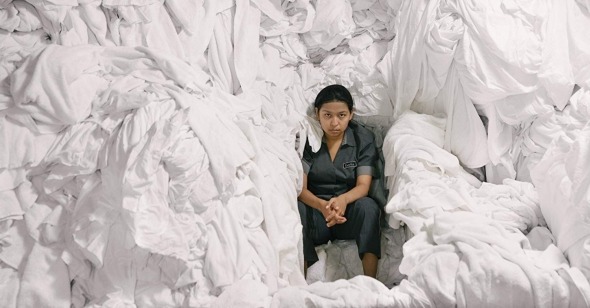Moving Up
by Juan Diaz
The Chambermaid
Dir. Lila Avilés, Mexico, Kino Lorber
In The Chambermaid, Lila Avilés crafts an empathetic study of a lonely housekeeper, Eve (Gabriela Cartol), grinding through a near-Sisyphean cleaning job in order to eke out a better life. Though inspired by Sophie Calle’s The Hotel, a photographic project in which the French artist worked as a chambermaid to surreptitiously take photos of guests’ personal belongings, Avilés’s debut film is hardly voyeuristic. It is instead an intimate look at the unseen labor of a young woman whose stirrings of desire and hope bump up against a difficult reality.
Despite her present circumstances, Eve is actively focusing on her future. She is taking GED classes before her shifts, and seeking a promotion onto a higher floor. During the work week she sleeps in a hiding spot in the hotel to avoid a brutal commute. Her actual home is nearly two hours away on the outskirts of Mexico City, so she entrusts the care of her child to a friend. She is only able to check in with her son over the phone during her limited breaks. The film never leaves the hotel, underscoring Eve’s confinement and the extent of her sacrifice. In Mexico and Latin America, poor women have historically been forced to seek employment far from home and family, and Eve’s situation is a modern iteration of this phenomenon.
Eve resists making the hotel her home. She does not appear to have many friends, and during lunch breaks keeps to herself and her homework. A window-washer makes romantic overtures, even drawing a soapy heart on the window of a room she is cleaning—she responds by closing the blinds. What others take for awkwardness or meekness is more of a repression in the service of her work. To render Eve’s isolation, Avilés often uses a shallow depth of field, in which only the immediate foreground—frequently Eve’s face—is in focus. The world around her is superfluous, a distraction from her work.
Avilés’s visual strategy amplifies Eve’s cloistering. Tracking and eye-level shots positioned in strategic corners evoke the following eye of a security camera. It often feels like we are watching a woman imprisoned. Cinematographer Carlos Rossini’s austere color palette and detached camera, nestled in the tight spaces of the hotel rooms, successfully turn a stylish hotel into a cramped prison. Avilés spent years developing her script by observing housekeepers at the same hotel where the film was shot. She accordingly grants her protagonist’s labor a respect rarely seen onscreen. Brushing blood from a bathtub or patting fresh linens into submission, Eve performs her work meticulously. Avilés smartly sits her camera still and lets her actress perform her tasks within the frame, à la Chantal Akerman’s Jeanne Dielman, 23 quai du Commerce, 1080 Bruxelles. And as in that film, even the occasional moment of quiet that Eve gets to enjoy is brimming with silent anxiety.
The film is populated almost entirely by women, their relationships a central part of Avilés’s focus. Eve’s growing relationship with new coworker Miriam, or Minitoy (Teresa Sanchez), is one that initially discomforts her. The lively Minitoy, who had been deported from the U.S., seems to view Eve’s boundaries as a challenge and often asks her indiscreet questions. But her rescue of Eve when she accidentally stains a guest’s linens allows Eve to finally warm up to her, and to begin to accept the possibility of human connection. When Minitoy starts looking like another contender for the promotion, however, it reveals that friendship in a place like this can be fraught.
The Chambermaid incisively explores the ways economic inequities color working women’s interpersonal relationships. Though there is occasional solidarity, there is also an undercurrent of distrust, or an eagerness to re-perform on others the mistreatment visited on them. The woman who operates the elevator curtly reminds Eve she can’t eat her snack, her single meal for the day, inside the elevator. Later, the same woman reveals that an injury put her out of a higher-status job at the hotel, and she was assigned to elevator duty. Eve’s munching of popcorn is an affront to the one space where she has a semblance of control. When a strict supervisor, a former housekeeper herself, writes up Eve for not finishing a room on time, she reminds Eve that discipline was far more severe when she was in her position. These women offer what they think is crucial knowledge to survive.
Eve is not content with just surviving, however. She has a growing interest in the world that lies beyond the hotel’s glass walls. When, near the end of the film, her professional plans take a blow, Eve realizes the folly of giving your life to an institution that sees you as dispensable. Dejected, she sneaks into the upper levels of the building, clutching the second-hand dress she was given by the lost-and-found department as a terribly timed consolation. In a wide shot on the roof of the building (and the first scene set entirely outside), Eve takes in the city view, one she has only seen through the hotel’s windows. The possibility of other horizons has been imprinted on her. That this discovery is relayed so quietly is a testament to Avilés’s humane direction and Cartol’s graceful performance.
